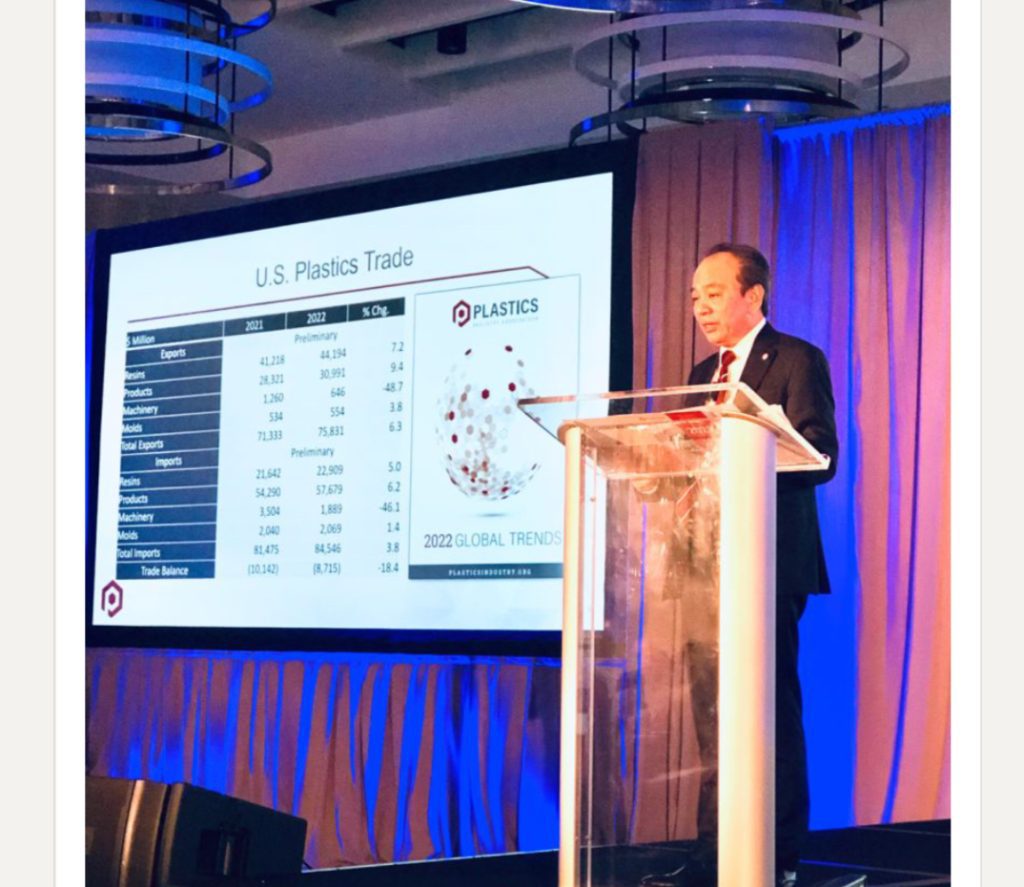by Dr. Perc Pineda, PhD
Chief Economist, Plastics Industry Association
As government representatives gather in Paris, France, this week under the auspices of the United Nations Environment Assembly, to discuss an international, legally binding instrument on plastics, it is crucial for all participants to consider the millions of workers employed in the global supply chain of the plastics industry.
Be careful with the term “waste”
It is equally important to recognize that the plastics industry operates in a global market. Therefore, the principle of free trade should continue to guide the global market for plastics. One aspect of the plastics trade involves the exchange of items classified as “waste, parings, and scrap of polymers of ethylene (HTS 3915.10), polymers of styrene (HTS 3915.20), polymers of vinyl chloride (HTS 3915.30), and of plastics not elsewhere specified or indicated (HTS 3915.90).”
While the Harmonized Tariff Schedule (HTS) includes “waste” in the description, it is important to acknowledge that these items should not be defined as “waste” in the traditional sense. If we embrace the concept of circular production, we should reframe them as ‘recyclable plastic materials.’ The are inputs to production and should be accessible to all manufacturers worldwide. Facilitating the open trade of plastic materials for recycling between countries aligns with the goal of transitioning to a circular economy.
Circularity requires circulation of materials
In the past decade, the U.S. experienced a decline in its exports of plastic materials for recycling, accompanied by a corresponding increase in exports. From 2012 to 2022, U.S. total exports of plastic materials for recycling decreased by 78.5%, reaching 431,759 metric tons, as indicated in the table below. This decline can be primarily attributed to the plastics industry’s heightened focus on domestic recycling efforts in response to market demands against the backdrop of an industry that is continuously innovating towards greater sustainability.

Simultaneously, the U.S. has been augmenting its imports of recyclable plastic materials to meet the robust market demand. Over the course of the past decade, total imports of plastic materials for recycling in the U.S. experienced a significant rise of 19.4%, reaching 431,635 metric tons in 2022. Notably, in the previous year, 38.6% and 27.7% of these imports originated from Mexico and Canada, respectively.
Furthermore, in 2022, the U.S. imported 6,765 metric tons of plastics materials for recycling from China, while exporting 1,735 metric tons to China during the same year. As a result, China maintained a trade surplus of 5,030 metric tons of plastics materials for recycling with the U.S. in 2022.
Solutions must be fair
“There is widespread support from various sectors of the global economy to address environmental threats in a materials-neutral manner. It is also advocated that any negotiated measures concerning plastics should not be utilized to hinder market access for plastic materials and products. The goal should be to ensure that efforts to keep plastic waste out of the environment and in the economy do not unfairly impede the trade of plastic materials and products, allowing equal opportunities for all participants in the global market,” says Dr. Pineda.
The Plastics Industry Association (PLASTICS) is the only organization that supports the entire plastics supply chain, including Equipment Suppliers, Material Suppliers, Processors and Recyclers, representing over one million workers in our $468 billion U.S. industry. PLASTICS advances the priorities of our members who are dedicated to investing in technologies that improve capabilities and advances in recycling and sustainability and providing essential products that allow for the protection and safety of our lives.
Since 1937, PLASTICS has been working to make its members, and the sixth largest U.S. manufacturing industry, more globally competitive while supporting circularity through educational initiatives, industry-leading insights and events, convening opportunities and policy advocacy, including the largest plastics trade show in the Americas, NPE2024: The Plastics Show
Source: Camille G, Plastics Industry
































